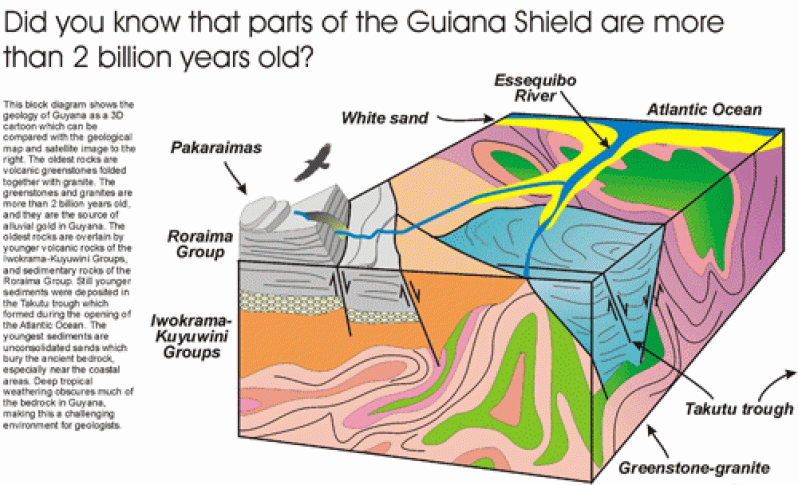Geoscope
This block diagram shows the geology of Guyana as a 3D cartoon which can be compared with the geological map and satellite image to the right. The oldest rocks are volcanic greenstones folded together with granite. DID YOU know that parts of the Guiana Shield are more than 2 billion years old?
The greenstones and granites are more than 2 billion years old, and they are the source of alluvial gold in Guyana. The oldest rocks are overlain by younger volcanic rocks of the Iwokrama-Kuyuwini Groups, and sedimentary rocks of the Roraima Group.
Still younger sediments were deposited in the Takutu Trough which formed during the opening of the Atlantic Ocean. The youngest sediments are unconsolidated sands which bury the ancient bedrock, especially near the coastal areas. Deep tropical weathering obscures much of the bedrock of Guyana, making this a challenging environment for geologists. (Diagram by Dr. Eva Valeski, and courtesy of the GGMC Geo-Services Division)
Do you know what a geologist does?
Geologists do practical work; from discovering deposits of oil, metals and gems, to preserving beaches, harbours and wetlands. They also attempt to solve problems that stem from society’s use and misuse of the natural world, and recommend more sustainable use of our resources.
Much of what a geologist does involves problems that affect millions of people, such as earthquake prediction, estimations of groundwater reserves, or petroleum exploration. The work of the geologist in the mining industry aims at providing, through exploration, mapping and research information on the potential, occurrence, nature, quality and size of economic mineral resources and construction materials.
Geo-science Specialists
Like all other professions, most geologists specialize, and the work carried out by members of each specialty has practical human applications. Some categories of Geo-science Specialists are:
Geophysicists, who decipher the Earth’s interior and magnetic, electrical and gravitational fields.
Geochronologists determine the age of rocks by calculating the rates of decay of certain radioactive elements, and thus help reconstruct the geologic history of Earth.
Geochemists investigate the nature and distribution of chemical elements in rocks and minerals.
Petroleum Geologists are involved in exploration and production of oil and natural gas.
Economic Geologists explore for, and develop, geologic materials that have profitable uses.
Hydro-Geologists study the abundance, distribution and quality of groundwater and related geological aspects of surface water.
Engineering Geologists investigate geological factors that affect engineering structures, such as bridges, buildings, airports and dams.
Environmental Geologists work to solve problems of pollution, waste disposal, urban development, and hazards such as flooding and erosion.
Seismologists determine the location, magnitude and origin of earthquakes, and trace the behaviour of earthquake waves to interpret the structure of the earth.
Geomorphologists study the effects of Earth process, and investigate the nature, origin and development of present landforms and their relationship to underlying structures.
Marine Geologists investigate the oceans and continental shelves, while Mineralogists study the occurrence, formation, composition, structure and properties of minerals.
Paleontologists study fossils, to understand past life-forms and their changes through time to reconstruct past environments.
Petrologists determine the origin and genesis of rocks, by analyzing mineral or grain relationships.
Sedimentologists study sedimentary rocks and processes of sediment formation, transportation and deposition.
Stratigraphers investigate the time and space relationships of layered rocks and their fossil and mineral content, and
Structural geologists study deformation, fracturing and folding that has occurred in the Earth’s crust.
Academic requirements for becoming a geologist
Students interested in a career in geology should attempt to read as much as possible about geology and geologists. It should also be helpful to take a short course in the field of geology to get an idea of the practical applications of the subject.
Aptitude not only for geology, but also for Physics, Chemistry, Biology and Mathematics is essential. Personal qualifications, such as a liking for outdoor activities and physical stamina are requisites for the kind of working conditions involved.
The academic requirement for becoming a Geologist at the Guyana Geology and Mines Commission is a Bachelor of Science Honours Degree in Geology or Mining Geology from a recognised University or its equivalent.
The Geological Technician, who serves as a Geologist’s assistant, has a Technician Diploma in Mining, Geology or Civil Engineering from the University of Guyana or any other recognized Institution of higher education.
SOURCE: Block Diagram and Map (prepared by Dr. Eva Zaleski) courtesy of the Guyana Geology and Mines Commission (GGMC) GeoServices Division. Info also courtesy of GGMC Geo-Services Division.




.png)









